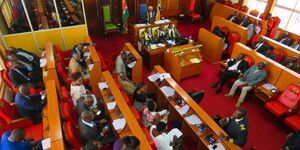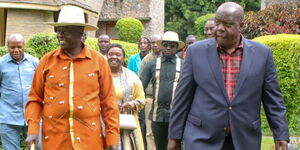On Wednesday, April 9, United States President Donald Trump halted for 90 days his government's reciprocal tariffs imposed on Kenya and other countries except China.
Through a statement on social media, Trump revealed that the new development came about after various consultations between the US and countries affected by the tariffs, such as Kenya. He also highlighted that these countries did not present any opposition to the tariffs.
Aside from the pause, Trump also announced a reduced reciprocal tariff during this period, which applied to countries that had been hit with tariffs of more than 10 per cent.
“Based on the fact that more than 75 countries have called representatives of the United States, including the Departments of Commerce, Treasury, and the USTR, to negotiate a solution to the subjects being discussed relative to trade, trade barriers, tariffs, currency manipulation, and non-monetary tariffs, and these countries have not, at my strong suggestion, retaliated in any way, shape, or form against the US, I have authorised a 90-day pause,” he stated.
“Also a substantially lowered reciprocal tariff during this period, of 10 per cent, also effective immediately,” Trump added.
The latest comes after Trump, on Wednesday, April 2, signed a new executive order imposing reciprocal tariffs on trade with Kenya.
Under the new tariffs signed by Trump, Kenya's Ksh109.7 billion (784 million USD) trade with the US was set to suffer a blow after a 10 per cent baseline tariff was imposed on all of Kenya's exports.
The tariff would affect Kenyan exports, particularly in key sectors such as textiles, tea, and coffee, which have been exempt from tariffs under the African Growth and Opportunity Act (AGOA).
This, in turn, could lead to reduced exports, job losses, and lower revenues for businesses relying on the American market. Announcing the signing of the new tariffs, Trump maintained that the purpose of imposing the tariffs was mainly to protect America's interests in trade with the countries affected.
As per the Central Bank of Kenya Governor Kamau, Trump’s tariff could lead to Kenya losing Ksh12.8 billion ($100 million) annually in exports to the United States.
Kenya, which has been America’s sixth biggest trading partner in Africa, was set to pay a total of 20 per cent levy on exports to the US cumulatively. Also affected are all other African countries, with most nations slapped with the minimum tariff rate, like Kenya.
Even so, Thugge clarified that the impact of Trump’s new levy on the country’s exports would not have any significant impact on Kenya’s economy.
The US had also warned of impending consequences over Kenya’s imposition of a 50 per cent tariff on US corn imports, citing it as unfair trade practices. As per the department, the move effectively blocked US corn exports to Kenya despite the market's budding potential.












